ESET vs Avast: Which antivirus is better in 2025?
I tested ESET and Avast head-to-head
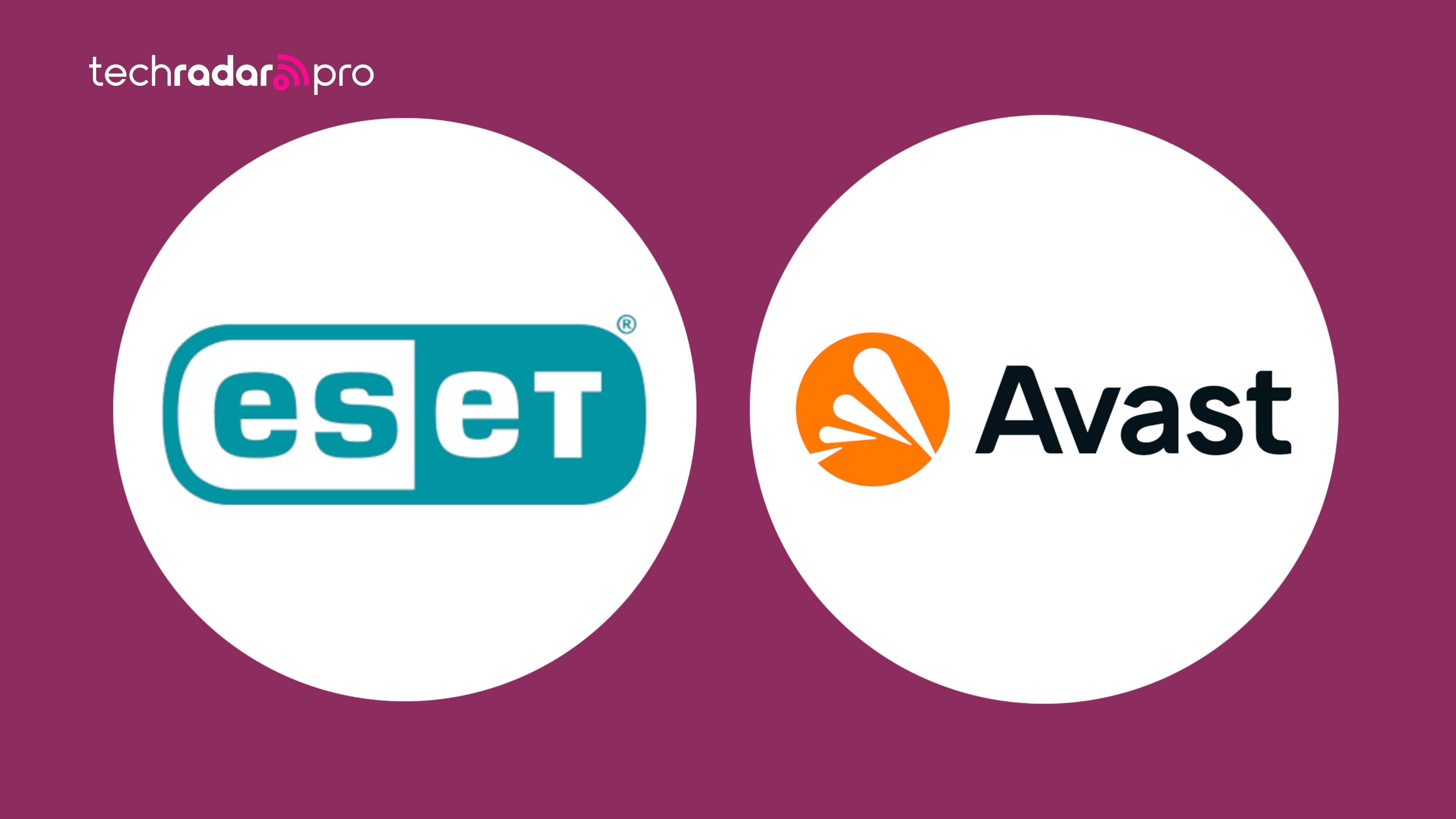
When it comes to the best antivirus software, ESET and Avast are routinely in the conversation, and for good reason - they deliver on their promise of online freedom and protection for individual and business users. Solutions aimed at the former group will be the focus of this article, so if you’ve narrowed down the choice to these two vendors, you’re off to a great start.
Now, it’s a matter of getting into the nitty-gritty to figure out which one does what exactly, as antivirus software these days includes all kinds of stuff. In the next 10 minutes or so, we’ll cover every aspect of ESET’s and Avast’s antivirus offerings, from their malware detection rates and ease of use to available features and everything in between.
Each has its strengths and weaknesses, and we’ll supply you with both so you can make the best (and informed) decision on which one is better for your needs.
ESET versus Avast: Background
Founded in 1992 in Bratislava, Slovakia, ESET is a privately-owned, global cybersecurity company whose origins go back to 1987, when two of its founders developed their first antivirus program called ‘NOD’. The company’s NOD32 antivirus is a, well, nod to its beginnings, and highly popular with individual users due to its lightweight performance and excellent detection capabilities. ESET also has a notable presence in the business security market, especially for SMBs.
Some 330 kilometers to the northwest, Avast was formed in 1988 in Prague, Czech Republic (then Czechoslovakia). As another multinational cybersecurity software player, the company pioneered the freemium model in 2001, which largely helped it shoot to the top of the consumer antivirus market. In September 2022, Avast was acquired by NortonLifeLock (rebranded to Gen Digital Inc.), operating as a subsidiary under the Gen Digital umbrella - much like Norton, AVG, LifeLock, and Avira.
Both hold a significant share of the home user market, and more importantly, offer a similar antivirus product portfolio, either as core security technologies or add-ons found in their highest-tier packages. So, the only tangible difference might be the level of user-friendliness and, of course, the price tag.
ESET versus Avast: Security features
As the company’s most comprehensive AV solution, ESET Home Security (you might know it by its previous name, ESET Internet Security) comes with three subscription tiers, starting with solid core protection and adding more security (and utility) layers with each plan.
Sign up to the TechRadar Pro newsletter to get all the top news, opinion, features and guidance your business needs to succeed!
On the other hand, Avast One is the all-in-one consumer option that balances antivirus with privacy and performance tools, ranging from the Basic (and free) plan to the Gold subscription. Family options are included for each tier.
What’s important is that the two companies supply robust core antivirus protection, so you'll find a common set of essential security features in their offerings. This includes potent real-time threat detection, a capable firewall, anti-phishing and anti-spyware mechanisms, and ransomware protection, among other things.
Real-time threat detection
In the antivirus circles, ESET is renowned for its sophisticated, lightweight malware detection. It employs a multi-layered engine that contains advanced heuristics, machine learning, signature- and cloud-based scanning (called ESET LiveGrid) to identify and neutralize emerging threats with remarkable accuracy, often without causing unnecessary alerts. Its effectiveness in catching new and unknown threats is a consistent highlight in independent lab tests, earning it high marks for protection.
Avast, potentially provides even more powerful malware-stopping abilities, consistently performing well in independent evaluations for its real-time defense. Its massive user base contributes to a vast threat intelligence network, and in conjunction with AI-driven heuristics, allows it to quickly identify and respond to new dangers. The provider prides itself on near-perfect detection rates, even for new online threats.
Firewall
ESET's firewall is highly regarded for its configurable options, offering users granular control over network traffic and incoming connections. It works diligently in the background, identifying suspicious network activity and providing advanced users with the tools to fine-tune their network security. It does a great job of blocking unauthorized access and alerting you to potential vulnerabilities on your network.
There is also a handy firewall Learning Mode meant to ease the initial configuration, as you can automatically create and save rules based on specific parameters you define. That said, ESET warns against its permanent use since all outgoing and incoming communications are allowed, which means your device is not fully protected by the firewall.
Avast's firewall is designed in the same vein, safeguarding against network attacks and controlling which applications can access the internet via application and network-based rules. It works as intended to prevent untrusted programs from communicating externally and is integrated into the broader Avast One suite to offer comprehensive network defense.
The firewall also has a few handy options, such as ‘Gamer Mode’ to pause notifications and maximize performance when gaming sessions kick in, Leak Protection to prevent your computer from leaking potentially sensitive information to the network, and Port Scan Alerts to alert you in case threat actors or malware attempt to scan your device for open ports.
Identity theft protection
This is arguably the first area where the two companies diverge, reflecting their philosophies and market strategies.
ESET's focus on identity theft protection is reserved for its Ultimate tier, where it focuses more on proactive dark web and social media monitoring and alerts, notifying you if your data is exposed, and offering somewhat limited assistance for recovery. The company frames this aspect as part of its broader "proactive identity protection" rather than a deeply integrated identity theft service.
That is best evidenced in lower tiers that don't come with identity theft protection per se, relying more on essential security features to prevent data breaches on your device (like anti-phishing and secure banking). In other words, while they protect your device from malware that could lead to identity theft, they don't actively monitor your identity data for leaks or provide recovery services.
Avast One's approach to identity theft protection is a bit more meaningful, as it's integrated into all of its plans and notably more encompassing in higher ones. Avast One Gold steps up from the basic dark web monitoring found in lower tiers and introduces features like BreachGuard, which is a more advanced level of data breach monitoring, generally offering a more proactive approach to safeguarding your identity.
However, it stops short of the full-scale restoration services and credit monitoring you’ll find in Avast One Platinum, a product primarily targeted at the US market. It acts as one big identity safety net, offering SSN tracking, lost wallet assistance, and hands-on restoration services with financial reimbursement.
VPN
ESET offers a VPN, but it's included solely in its highest-tier solution. If you have money to splurge on that package, then the VPN you’ll get will come with unlimited access and a host of usual VPN features like split tunneling (you set which apps are covered by your encrypted VPN tunnel and which ones bypass it), public Wi-Fi and DNS leak protections, and over 60 locations to choose from. Though it can’t compete with the best VPN service and their array of bells and whistles, it’s more than a capable addition to the overall security posture.
By contrast, Avast bundles its VPN in all Avast One offerings, including a relatively generous data allowance (5 GB/week) in its free tier, though with location limitations. While functional for basic privacy needs, it doesn’t offer an extensive server network nor as many features as its competitor today, even with paid plans. Instead, the VPN feels more like a supplementary feature, likely because Avast offers a separate VPN product called Avast SecureLine VPN, where all the advanced features and server options are stashed.
Password manager
ESET includes a password manager for Android, iOS, and Mac, as well as browser extensions for Chrome, Firefox, Edge, and Safari. It provides secure storage and generation of strong passwords with multi-factor authentication options, thus simplifying the management of credentials securely across devices. You can also import passwords from various browsers and password managers.
Interestingly, Avast doesn't always offer a full-fledged password manager in the traditional sense, so you can forget about the basics like password creation and auto-filling. Its emphasis is on alerting users if their credentials have been exposed in a breach. There is a feature called Browser Shield, which limits access to passwords stored in your browser, so there’s that.
Parental controls
Through fundamental parental control app functionalities, ESET focuses on content filtering and activity logging. While it allows for blocking of certain content types and monitoring online behavior, it offers a more streamlined set of features compared to some competitors in the AV field, lacking more advanced options like time restrictions for device usage.
Nonetheless, it’s far better than what Avast One brings to the table, which is nada. It doesn’t include built-in parental controls, but rather supplementary features like Web Shield to block specific websites (along with a basic VPN) for online protection of the little ones.
ESET versus Avast: System performance
For many years, ESET has consistently been praised for its minimal impact on system performance. Independent lab tests often highlight ESET as one of the lightest antivirus solutions, praising its ability to keep your computer running smoothly even during scans or when performing demanding tasks. The latest April 2025 tests from AV-Test put the company’s Ultimate package as one of the lower-rated (but still very good) Windows 11 AVs in terms of performance, earning a score of 5.5 out of 6.
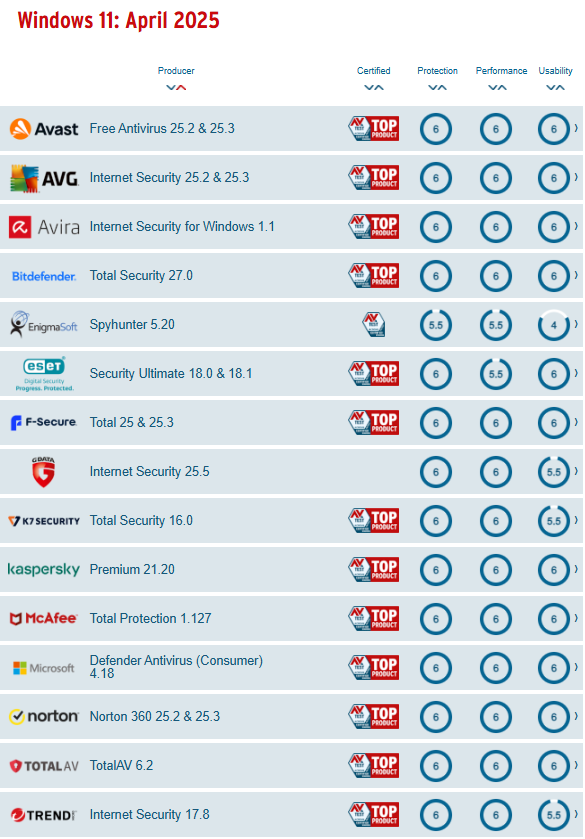
During the same tests, Avast came ahead of ESET, scoring a maximum of 6 points. This isn’t surprising, since Avast has a reputation for being very light on resources, even during intensive operations. Both companies are clearly committed to making sure that their solutions don't bog down your system, allowing for a seamless digital experience.
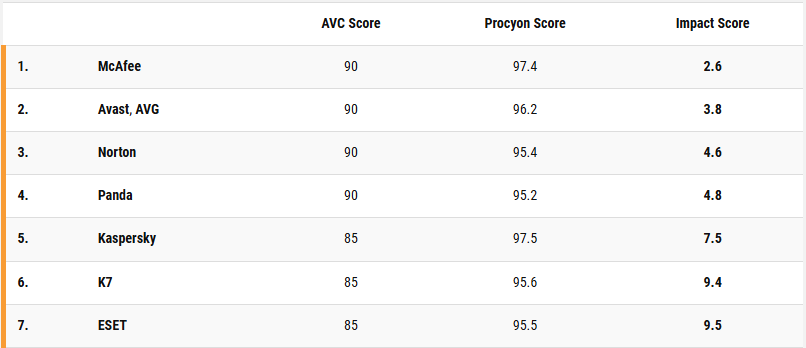
In the Performance Test by AV-Comparatives from the same month, Avast’s free offering was a runner-up with an impact score of 3.8 (the lower the score, the better), while ESET’s HOME Security Essential 18.1 came up seventh with a 9.5 impact score. Both solutions earned the ‘Advanced+’ award - the highest one.
So, if you’re operating on an older machine or prioritize speed, ESET and Avast will be excellent choices.
ESET versus Avast: Ease of use
It’s no secret that interacting with your antivirus can greatly impact how (and in some cases, if) you use its features. There are minimal differences here in terms of user-friendliness, but there are some slightly contrasting preferences apparent.
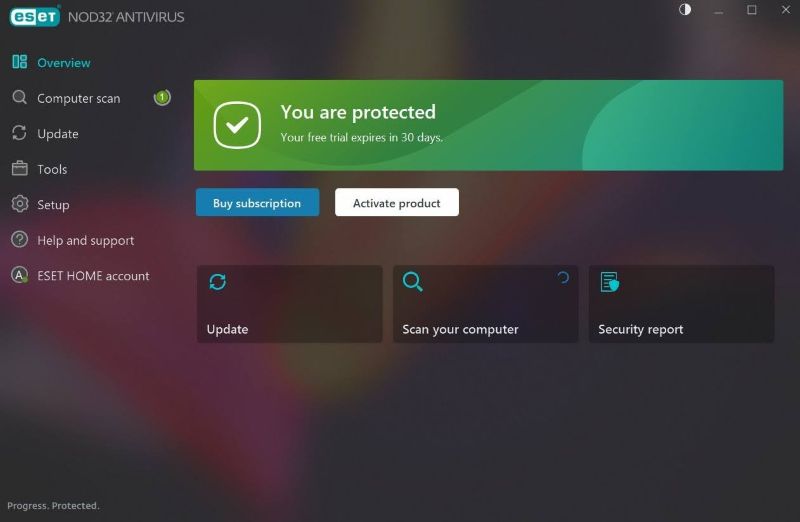
ESET's user interface is best described as clean, professional, and highly configurable. It might appear simpler on the surface, but once you scratch beneath the veneer, you’ll see that it offers considerable depth for advanced users who want to tinker with settings. That’s not to say that beginners will face hurdles on their way, since the main dashboard provides a clear overview without being overwhelming.
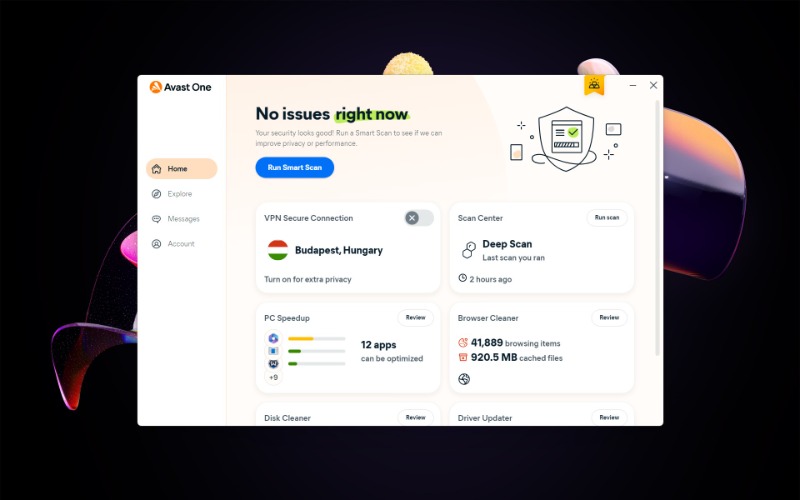
Avast's interface is designed to be sleek, modern, and exceptionally user-friendly. It’s a great example of how ease of access should be implemented when there is a broad range of features in the mix. Its intuitive layout and friendly graphics contribute to a smooth user experience, making it approachable for all users, including those new to cybersecurity.
In the end, more advanced users may prefer ESET’s clean layout and the depth of its settings, while their casual counterparts may find Avast more intuitive and straightforward.
ESET versus Avast: Protection
Ultimately, the effectiveness of every antivirus out there boils down to its threat-stopping capabilities. Based on the previously mentioned tests that also covered protection levels, ESET and Avast bring their A-game.
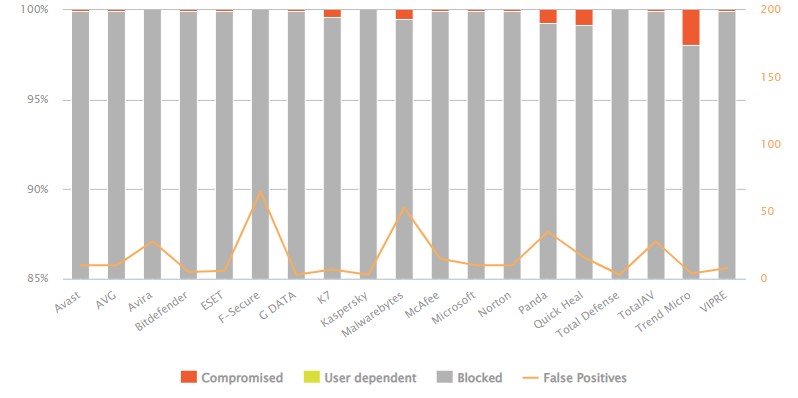
The former scored top marks in the ‘Protection’ (protection against malware and other attacks) and ‘Usability’ (false alarms and possible limitations in using the internet) categories during AV-Test trials, both for its macOS and Windows apps. Avast had the identical score on both platforms - a big reason why it is the best-performing antivirus in our list of the best antivirus software when it comes to malware-busting abilities.
Tests performed by AV-Comparatives for malware protection from March 2025 corroborate the narrative. Both antiviruses passed the test with flying colors, with Avast registering a 97.7% offline detection rate, 99.3% online detection rate, and 99.96% online protection rate.
ESET had negligibly lower percentages, with a 96.5% offline detection rate, 97.2% online detection rate, and 99.95% online protection rate. That being said, it had fewer false alarms at 6, compared to Avast’s 10.
ESET versus Avast: Pricing
ESET's pricing can be customized depending on your needs. For example, a single device license of ESET Home Security Essential for one year is $34.99, increasing by $3.50 with each extra device added. This tier includes ESET's excellent antivirus and privacy protection, including anti-phishing and Wi-Fi protection tools.
The second tier, Home Security Premium, costs $41.99 for a single device for one year, and also increases by $3.50 per device added. This tier includes all the goodies in the Essential tier, plus a password manager, file encryption, and additional threat-detection tools.
The final tier, Home Security Ultimate, comes as a 5 device license as standard, with the cost coming in at $125.99 for a single year. Each additional device is, you guessed it, $3.50. Along with all the previous inclusions in the Essential and Premium plans, you can add a VPN and identity protection to your basket of antivirus tools.
Avast One is a little bit kinder on the wallet. Avast offers a free ‘Basic’ tier which provides you with malware protection and security features on a single device, but it does impose a VPN data cap, and has no identity protection tools.
The first premium plan is Avast One Silver Individual, which gives you a three device license, removes the VPN limitations, and costs $35.88 per year. Avast One Gold Individual is the next tier up at $83.88, and supports five devices as well as unlocking the identity theft protection features.
If you really wanted to, you have the option to extend the protection to up to thirty devices using the ‘Family’ variants for both ‘Silver’ and ‘Gold Tiers’ of Avast One, priced at $59.88 and $113.88, respectively.
Note that these exact prices refer to the first year of use. Renewals will generally cost twice that.
ESET versus Avast: Which is best?
The decision to settle on either of the two AVs will largely depend on your priorities. The notable differences between ESET and Avast lie in their configurability, which ESET excels in, and in the beginner-friendly interface, which is where Avast has the edge.
Performance-wise, they’re pretty similar, exercising razor-sharp detection and protection, so you’ll be in good hands with either.
Sead is a seasoned freelance journalist based in Sarajevo, Bosnia and Herzegovina. He writes about IT (cloud, IoT, 5G, VPN) and cybersecurity (ransomware, data breaches, laws and regulations). In his career, spanning more than a decade, he’s written for numerous media outlets, including Al Jazeera Balkans. He’s also held several modules on content writing for Represent Communications.
You must confirm your public display name before commenting
Please logout and then login again, you will then be prompted to enter your display name.